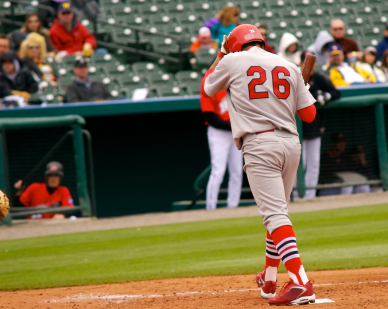By Ethan Guevin
The Situation: It is late in a tie ballgame. The three-hitter for the visiting team is on deck. He has struggled all game, not seeing the ball well and swinging at bad pitches. To make matters worse, the opposing fans have been all over him. As he goes out on deck, he realizes his back pocket is hanging out. But just as he goes to tuck it in, the fans in the front row of the student section yell down to him, “Hey, Peter! You have an elephant ear! Tuck it in, it will be the only thing you accomplish all night.” He decides to leave the pocket out, but the fans are in his head. As the long at bat before him drags on, the fans get more personal, asking if he needs his mother (who they address by name) to come tuck it in for him. When one fan steps way over the line, Peter turns to the fans and says something regrettable. As he turns back, he realizes it is his turn to bat—a critical AB with a runner at 3rd and 1 out.
The Play: As Peter walks up to the plate, he realizes that he knows very little about the pitcher, who is pitching his first inning. The first pitch comes in, a slider over the middle for a called strike. Pitch two, a fastball comes screaming in on the outer half and Peter swings late, surprised by its velocity. In a big hole 0-2, Peter doesn’t remember what the pitcher threw to the batter before him in the same count. The slider comes in starting at the knees and breaks into the dirt. Peter swings right over the top of the ball, unable to lay off the pitch like his teammate before him.
The Outcome: The easy scoring opportunity has been squandered. There will be no RBI ground out. Now, the next batter must get a hit or extend the inning to have a shot to score. Unfortunately, he strands the runner at 3rd.
What Went Wrong?
Part of being a good player involves learning through observation and being involved in the game, even when you are not directly involved in the action. By simply paying attention, a player can gain a lot of insight and greatly increase his chances for success. In this situation, instead of being locked in on the game, Peter gets distracted by the fans, who get exactly what they want by flustering and getting him to focus on them and not the task at hand. With the fans on his mind, he fails to realize that the pitcher threw the same pitch sequence to the batter before him, a pattern that could have helped him lay off the 0-2 slider.
Saying something back to fans is an absolute NO-NO. It can never be done. As you move from high school to college, jeers and trash talk from the fans become much more commonplace. Some fans are notorious for doing in-depth research on players so they can get personal and try to get under their opponents skin. Ignore them. Getting worked up over it can only hurt you and this is a great example of the detrimental effect of reacting and paying too much attention to fans. Peter lets the fan distraction interfere with his preparation, contributing directly to his failure to execute for his team. Just like learning from observation in the game, learn from Peter’s mistake so that you don’t get duped into anything like it when you play. Avoid distractions and think the game!







